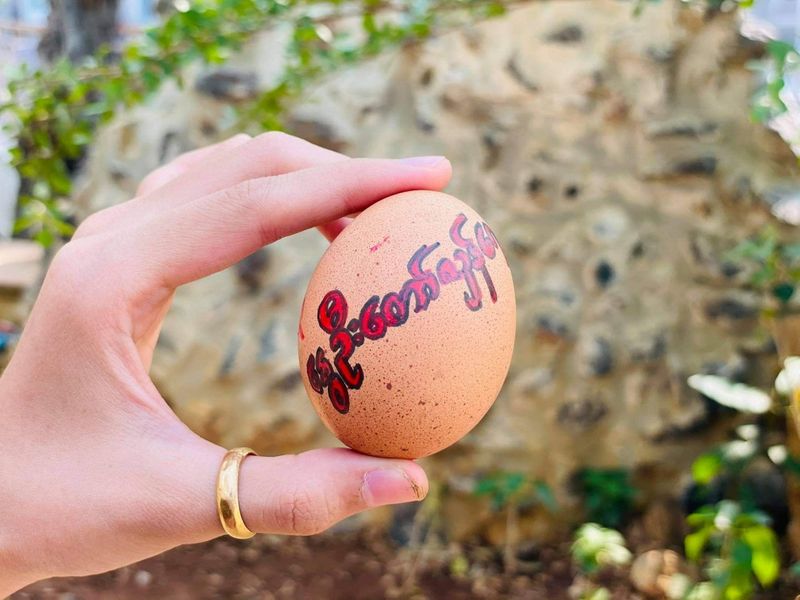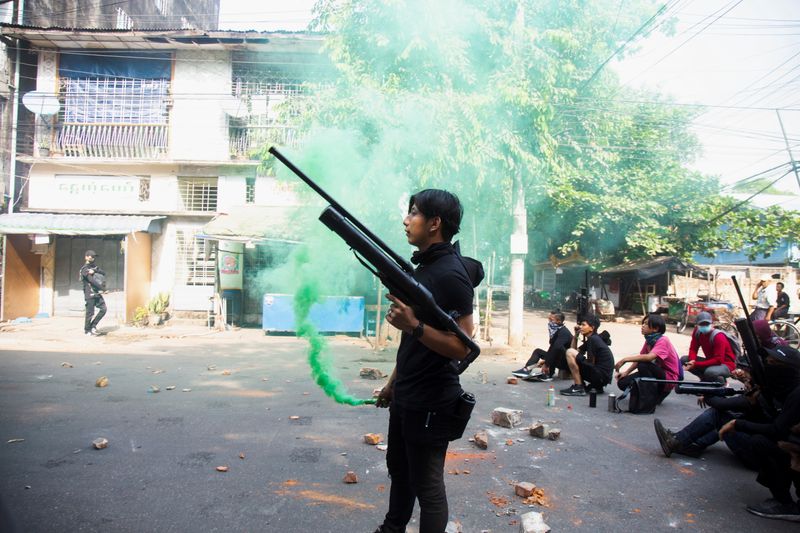(Reuters) -Opponents of military rule in Myanmar inscribed messages of protest on Easter eggs on Sunday while thousands of others were back on the streets, denouncing a Feb. 1 coup and facing off with the security forces who shot and killed two men.
In the latest in a series of impromptu shows of defiance, messages including "Spring Revolution", "We must win" and "Get out MAH" - referring to junta leader Min Aung Hlaing - were seen on eggs in photographs on social media.
"Easter is all about the future and the people of Myanmar have a great future in a federal democracy," Dr Sasa, international envoy for the ousted civilian government, said in a statement. Sasa, who uses only one name, is a member of a largely Christian ethnic minority in the predominantly Buddhist country.
Opponents of military rule have mounted a civil disobedience campaign since the military overthrew the elected government of Nobel laureate Aung San Suu Kyi, that has included creative shows of defiance promoted on social media.
Young people in the main city of Yangon handed out eggs bearing the messages of protest, pictures in posts showed.
Crowds have returned to the streets day and night to reject the return of military rule after a decade of tentative steps towards democracy. Numerous candle-lit vigils took place overnight.
The Assistance Association for Political Prisoners (AAPP), an activist group monitoring casualties and arrests, said the toll of dead had risen to 557, as of late Saturday.
In the capital, Naypyitaw, two men were killed when police fired on protesters on motorbikes, the Irrawaddy news site reported.
Police and a spokesman for the junta did not answer telephone calls seeking comment.
Several thousand marched in the second city of Mandalay, according to images on social media, before police and soldiers moved in to disperse them.
Protesters also gathered in several other towns in the north and the south and a huge crowd, including many women in straw hats, streamed through the central town of Taze chanting slogans, pictures from DVB TV News showed.
The AAPP said 2,658 people were in detention, including four women and a man who spoke to a visiting CNN news crew in interviews on the streets of the main city of Yangon last week.
A spokesman for CNN said the network was aware of reports of detentions following the team's visit and was "pressing the authorities for information".
Struggling to end the protests, the junta has intensified a campaign to stifle criticism.
It ordered internet providers to cut wireless broadband and issued arrest warrants for nearly 40 celebrities known for their opposition to military rule, including social media influencers, singers and models, under a law against inciting dissent in the armed forces.
The charges, announced on state television's evening news bulletin on Friday and Saturday, can carry a prison term of three years.
'CONSCIENCE CLEAR'
One of those charged, blogger Thurein Hlaing Win, told Reuters he was shocked to be branded a criminal and had gone into hiding.
"I didn't do anything bad or evil. I stood on the side of truth," he said by telephone from an undisclosed location. "If I get punished for that, my conscience is clear ... Everyone knows the truth."
The military ruled the former British colony with an iron fist after seizing power in 1962 until it began withdrawing from politics a decade ago, releasing Suu Kyi from house arrest and allowing an election that her party swept in 2015.
It says it had to oust Suu Kyi's government because a November election, again won easily by her party, was rigged. The election commission has dismissed the assertion.
But many in Myanmar, including younger people who have come of age in the past decade of opening up, cannot accept the return of rule by the generals.
Suu Kyi is in detention facing charges that could bring 14 years in prison. Her lawyer says the charges are trumped up.
The coup has also triggered clashes with autonomy-seeking ethnic minority forces that have announced support for the pro-democracy movement.
The Karen National Union, which signed a ceasefire in 2012, has seen the first military air strikes on its forces in more than 20 years and says it must fight to defend itself from a government offensive.

Fighting has also flared in the north between the army and ethnic Kachin insurgents. The turmoil has sent several thousand refugees fleeing into Thailand and India.
Suu Kyi's party has vowed to set up a federal democracy, the minority groups' main demand.
